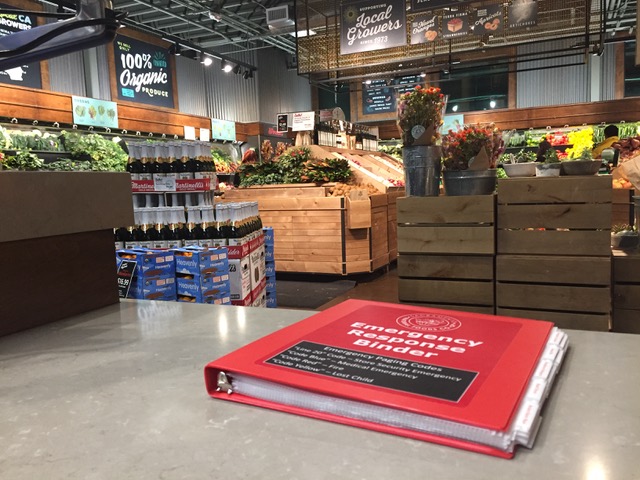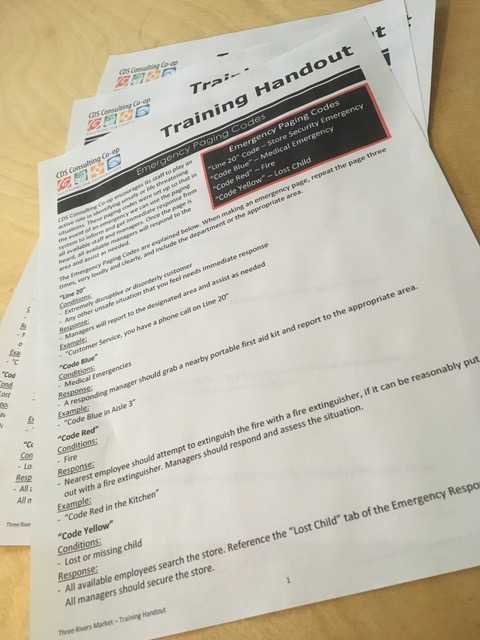
If one were asked to summarize an Emergency Preparedness philosophy in a succinct, no-nonsense maxim, “better safe, than sorry” would definitely be it. Defined simply as: “a serious, unexpected, and often dangerous situation requiring immediate action,” responding safely and effectively to any emergency requires thoughtful planning ahead of time, streamlined procedures, trained staff, and capable leaders.
 Planning. Just because you can’t plan for everything, doesn’t mean you shouldn’t plan at all. Businesses face common emergency situations like power failures, medical emergencies, severe weather, and lost children every day; while situations like fires, chemical spills, and robberies are much less likely, but still happen. In every case, having a comprehensive collection of detailed, step-by-step Emergency Response Procedures is essential in improving your team’s ability to respond quickly, confidently, and effectively. Critical information like emergency contact information, a list of emergency service providers, and necessary documentation forms should also be included. All this information should be consolidated into one well-organized, reproducible resource, and copies strategically located throughout your store.
Planning. Just because you can’t plan for everything, doesn’t mean you shouldn’t plan at all. Businesses face common emergency situations like power failures, medical emergencies, severe weather, and lost children every day; while situations like fires, chemical spills, and robberies are much less likely, but still happen. In every case, having a comprehensive collection of detailed, step-by-step Emergency Response Procedures is essential in improving your team’s ability to respond quickly, confidently, and effectively. Critical information like emergency contact information, a list of emergency service providers, and necessary documentation forms should also be included. All this information should be consolidated into one well-organized, reproducible resource, and copies strategically located throughout your store.
Training. Now that you have emergency response resources located throughout your store, you need to train your staff on how to use it effectively. Familiarize your staff with this resource as part of any more broad safety and security training. Make sure even your most seasoned employees are familiar with where the resources are located, what information can be found there, and how best to approach emergency situations. They don’t need to know it all by heart, but they need to know it’s there.
 Communication. Every co-op should set up an Emergency Paging Code System. In the event of an emergency, the store’s paging system is used to quickly inform your entire co-op staff of an emergency situation, and get an immediate response. Codes should be established for fire, lost child, medical emergency, and store security emergency. All staff should be trained on how to make a page, and how to respond if a page is heard.
Communication. Every co-op should set up an Emergency Paging Code System. In the event of an emergency, the store’s paging system is used to quickly inform your entire co-op staff of an emergency situation, and get an immediate response. Codes should be established for fire, lost child, medical emergency, and store security emergency. All staff should be trained on how to make a page, and how to respond if a page is heard.
Leadership. While your written procedures are there to help guide any staff person in responding effectively, your management team should have a better grasp of the policies and procedures, allowing them to lead a response as competently and efficiently as possible,
Planning ahead ensures you and your staff are prepared to quickly and efficiently respond to a wide array of possible emergency situations, and are better positioned to guarantee the safety and security of your employees and customers, the viability of your products, and the security of your store.
Grab and Go Solutions is a resource from CDS Consulting Co-op to provide easy to implement solutions to common issues facing food co-ops. Watch for future releases tackling a wide variety of topics including HR, governance, member engagement, safety, store and growth.


Brought to you by CDS Consulting Co-op safety and security consultants:
Paul Feiner and Michael Feiner
Have more questions?
Get in touch with one of our consultants.
